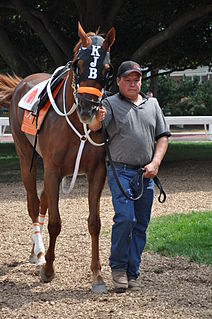
Mr. Prospector was a Thoroughbred racehorse who became an outstanding breeding stallion and notable sire of sires. A sprinter whose career was cut short by repeated injuries, he won seven of his 14 starts, including the Gravesend Handicap at Aqueduct Racetrack and the Whirlaway Handicap at Garden State Park.

Count Fleet was a champion American thoroughbred racehorse. In 1943, he became the sixth American Triple Crown winner when he won the Belmont Stakes by a then record margin of twenty-five lengths. After an undefeated season, he was named the 1943 Horse of the Year and champion three-year-old. Also a champion at age two, he is ranked as one of the greatest American racehorses of the twentieth century. He was inducted into the National Museum of Racing and Hall of Fame in 1961.
Tompion (1957–?) was an American Thoroughbred race horse.
Count Turf was an American Thoroughbred racehorse best known as the winner of the 1951 Kentucky Derby. He is one of only two equine families where three generations have won the Kentucky Derby. His grandsire Reigh Count won the 1928 Derby and then his sire Count Fleet won it in 1943. Count Fleet went on to win the U.S. Triple Crown. The only other father/son/grandson combination to win the Derby was Pensive (1944) who sired Ponder (1949) who in turn sired the 1956 winner, Needles.

Gulch was an American thoroughbred racehorse and sire. Owned and bred by Peter M. Brant, he was sired by the outstanding North American stud and graded stakes race winner Mr. Prospector out of the graded stakes race winning Rambunctious mare Jameela.
Fabius was an American Thoroughbred racehorse. In a career that lasted from 1955 through 1957, he ran sixty-two times and won eighteen races. He is best known for his performances in the 1956 Triple Crown: after finishing second in the Kentucky Derby. he won the Preakness Stakes and finished third in the Belmont Stakes.
Menow (1935–1964) was an American Thoroughbred racehorse. He won several important races in 1937, when he was voted American Champion Two-Year-Old Male Horse.
Pass Catcher was a United States Thoroughbred racehorse that won the 103rd running of the Belmont Stakes.
Personality (1967–1990) was an American Thoroughbred racehorse who was voted 1970 American Horse of the Year honors.
Jacola (1935–1959) was an American Champion Thoroughbred racehorse. Bred by Arthur B. Hancock, she was sired by the British import Jacopo, a son of the 1924 Epsom Derby winner, Sansovino. Jacola was out of the mare La France, a daughter of Sir Gallahad, who was the leading sire in North America in 1930, 1933, 1934, and 1940 and who sired 1930 U.S. Triple Crown winner Gallant Fox. A year following Jacola's birth, La France foaled U.S. Racing Hall of Fame inductee Johnstown, winner of the 1939 Kentucky Derby and Belmont Stakes.
Market Wise was an American Champion Thoroughbred racehorse.
Pavot was an American Thoroughbred Champion racehorse. In a career that lasted from 1944 to 1946 he ran thirty-two times and won fourteen races. He was the leader of his generation in 1944 when he was named American Champion Two-Year-Old Colt. The following year he recorded his most important win in the Belmont Stakes.

Chance Play was an American Champion Thoroughbred racehorse and Champion sire. In a career which lasted from 1925 to 1928 he ran in thirty-nine races and won sixteen of them. Although he was successful in his early career over sprint distances, he did not reach his peak until the age of four in 1927, when he was arguably the best horse in the United States, winning several major races including the two-mile Jockey Club Gold Cup.
Olambala (1906–1935) was an American Thoroughbred racehorse.
Ocean Wave was an American Thoroughbred racehorse who was a main rival of Count Fleet in the early 1940s. Owned by Calumet Farm, he was trained by Ben Jones and owned by Warren Wright, Ocean Wave was the son of Blenheim and Columbiana. He developed into a come from behind threat as a two-year-old and a three-year-old.
Blue Swords was an American Thoroughbred race horse who debuted as a two-year-old in 1942. Bred in Kentucky by Samuel D. Riddle, he was owned by Allen T. Simmons of Akron, Ohio, a rubber mogul and radio station operator. He was rated a close rival of Occupation, owned by Chicago, Illinois contractor John Marsch, in horse racing competition in the Western United States.
Vincentive was an American Thoroughbred racehorse from Maryland who won the 55th running of the Dwyer Stakes at Belmont Park on June 19, 1943. Owned by William Leavitt Brann, the colt defeated Famous Victory, owned by Mrs. Payne Whitney. Vincentive was ridden by jockey Johnny Gilbert, who weighed 111 pounds. The win was worth $19,600.

Ruler on Ice is a Thoroughbred racehorse that won the 2011 Belmont Stakes. He was bred and foaled in Kentucky by Brandywine Farm in partnership with Liberation Farm on. He is a chestnut gelding sired by Hill 'n' Dale Farms' Roman Ruler out of the Saratoga Six-bred mare, Champagne Glow. The colt was consigned as lot 988 at the 2009 Keeneland September yearling auction, where he was purchased by George and Lori Hall for $100,000. Ruler on Ice only won one minor race after winning the Belmont and was retired from racing in July 2014. He currently lives in Versailles, Kentucky at the farm of his owners.

Sickle was a British-bred thoroughbred racehorse who was later exported to the US where he was twice the leading sire in North America. He was bred by Edward Stanley, 17th Earl of Derby.
Pompey (1923–1944) was an American Champion Thoroughbred racehorse.









